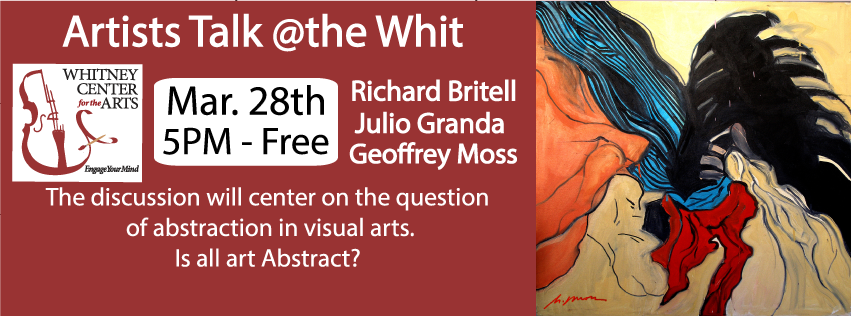 (PITTSFIELD, Mass.) – Artists Richard Britell, Julio Granda, and Geoffrey Moss will take place in the first of a projected series of Artists Discussions at the Whitney Center for the Arts on Saturday, March 28, 2015, at 5pm. The discussion topic will be “Abstraction,” and admission is free.
(PITTSFIELD, Mass.) – Artists Richard Britell, Julio Granda, and Geoffrey Moss will take place in the first of a projected series of Artists Discussions at the Whitney Center for the Arts on Saturday, March 28, 2015, at 5pm. The discussion topic will be “Abstraction,” and admission is free.
Britell, Granda, and Moss have long, successful and varied histories as artists, teachers and illustrators. Their works span a spectrum from representational painting to complete abstraction. The discussion will center on the question of abstraction in visual arts, and delve into the consideration that all paintings are, in a certain sense, abstractions for contemporary artists.
Additionally, we will explore some of the topics raised in the following definition by Art Encyclopedia:
“[The term ‘abstract art’ – also called “non-objective art”, “non-figurative”, “non-representational”, “geometric abstraction”, or “concrete art” – is a rather vague umbrella term for any painting or sculpture which does not portray recognizable objects or scenes. However, as we shall see, there is no clear consensus on the definition, types or aesthetic significance of abstract art. Picasso thought that there was no such thing, while some art critics take the view that all art is abstract – because, for instance, no painting can hope to be more than a crude summary (abstraction) of what the painter sees. Even mainstream commentators sometimes disagree over whether a canvas should be labelled “expressionist” or “abstract” – take for example the watercolour Ship on Fire (1830, Tate), and the oil painting Snow Storm – Steam Boat off a Harbour’s Mouth (1842, Tate), both by JMW Turner (1775-1851). A similar example isWater-Lilies (1916-20, National Gallery, London) by Claude Monet (1840-1926). Also, there is a sliding scale of abstraction: from semi-abstract to wholly abstract. So even though the theory is relatively clear – abstract art is detached from reality – the practical task of separating abstract from non-abstract can be much more problematical.]”
.
